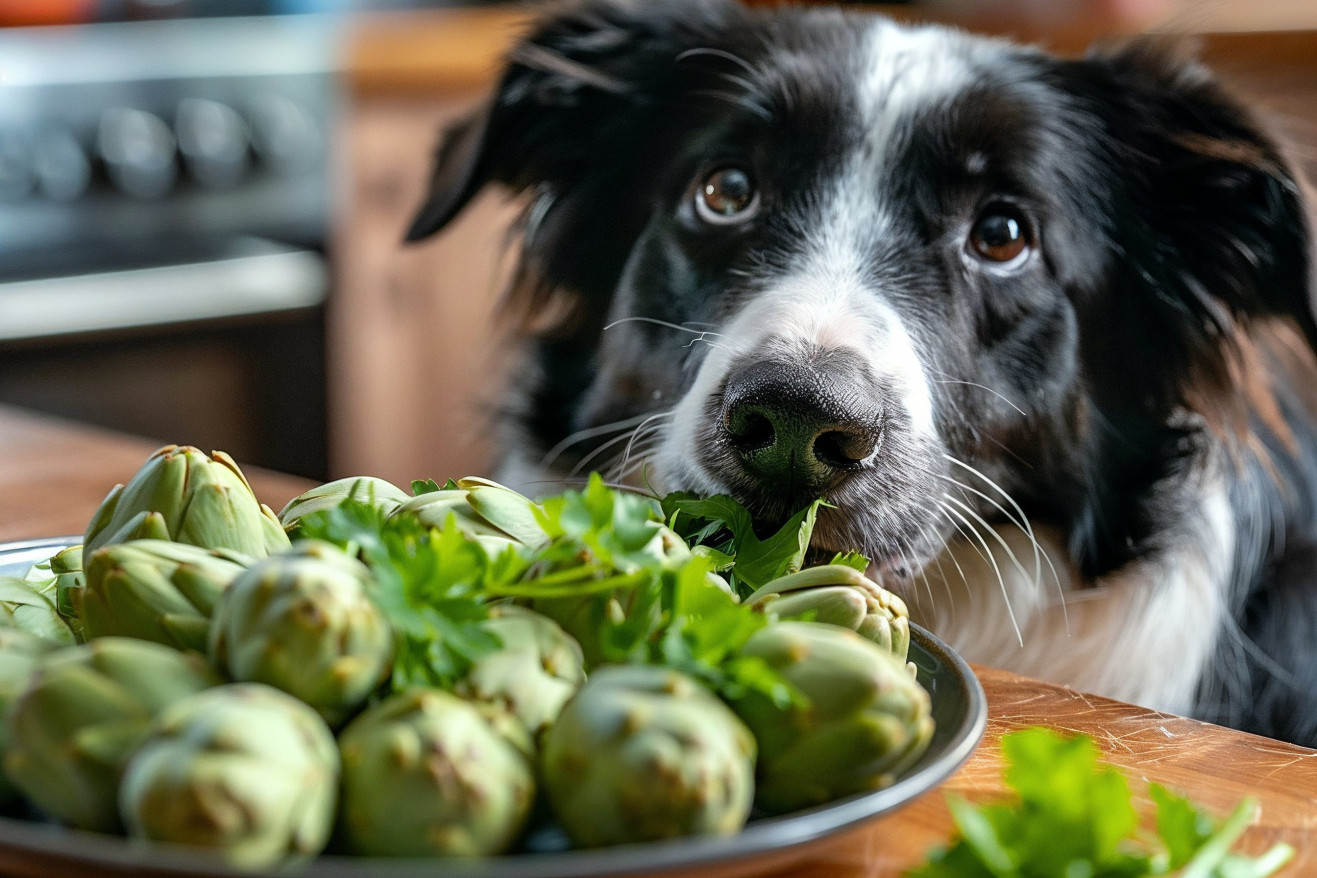Can Dogs Eat Artichokes? What to Know About Healthy Veggie Treats for Dogs
1 March 2024 • Updated 29 February 2024

Artichokes are a nutritional powerhouse, but can they also be a healthy snack for your furry friend? The answer is yes, dogs can eat artichokes in moderation. They offer a variety of vitamins, minerals, and antioxidants. Artichokes can be fed raw or cooked and plain, but marinated or fried artichokes should be avoided to prevent tummy troubles. Make sure to cut them into small pieces to avoid choking hazards.
This article will explore the ins and outs of veterinary science and research on canine nutrition to help you understand the potential benefits and drawbacks of giving your dog artichokes. We’ll cover how a dog’s digestive system works when it comes to plant-based foods, explain the best ways to prepare artichokes for dogs to eat, and go over the basics of a dog’s dietary requirements and limitations.
By the end of this article, you’ll have a thorough understanding of whether or not you should consider adding artichokes to your dog’s diet.
Can dogs eat artichokes?
Nutritional Profile of Artichokes for Dogs
In addition to being a gourmet vegetable, artichokes are a nutritional powerhouse that can help support your dog’s health. A Healthline article noted that artichokes are packed with fiber, antioxidants, vitamins, and minerals.
These nutrients include vitamin C, which is important for the immune system, and potassium, which plays a key role in muscle function and metabolism. The fiber in artichokes, particularly inulin, can help support gut health and may help dogs with sensitive stomachs, according to a study from the National Center for Biotechnology Information.
Research has also looked at how the antioxidants luteolin, quercetin, and gallic acid in artichokes can help support heart health, which could be helpful for dogs. Meanwhile, WebMD pointed out that fiber can help dogs feel full and support healthy digestion.
That said, it’s important to think about dietary restrictions. For example, the high potassium levels in artichokes may be a concern for dogs that are predisposed to kidney problems. Like with anything new that you add to your dog’s diet, it’s important to make sure that you’re feeding them artichokes in moderation. After all, a well-rounded diet that’s tailored to your dog’s specific needs is the key to their health.
How Dogs Digest Plant-Based Foods
From their origins as strict carnivores to their current status as human companions, dogs have adapted to a more varied diet that includes plant-based foods like artichokes. While their digestive system is shorter than that of herbivores, it’s also highly efficient at breaking down the starches found in plants, which is why dogs are considered omnivores.
In fact, the Clinical Nutrition Service at Cummings School explains that dogs’ pancreases are well-equipped to produce the enzymes necessary to digest carbohydrates, which contradicts the idea that dogs can’t process plant material. That said, dogs don’t produce cellulase, the enzyme needed to break down cellulose, a type of fiber found in plants.
Fortunately, most of the plants that dogs eat are low in cellulose, so this isn’t an issue unless dogs are eating a diet that includes a lot of high-cellulose plants like hay.
Studies have even shown that dogs have evolved to support their ability to eat a variety of foods. For example, a study published in Nature found that dogs have genetic changes that make them better able to digest starches than wolves. These changes are a result of dogs’ transition from carnivores to omnivores and allow them to get the vitamins they need from plant-based sources, according to the Clinical Nutrition Service at Cummings School.
Still, it’s important to be mindful when feeding dogs plant-based foods. A review published in PMC recommends that pet owners introduce new foods like artichokes slowly and pay attention to how their dogs’ digestive systems respond. By being mindful of these factors, pet owners can ensure that their dogs get the benefits of a varied diet without putting their health at risk.
How to Safely Prepare Artichokes for Dogs
To make sure that your dog can safely enjoy artichokes, it’s important to prepare them properly. First, make sure you’re starting with the freshest artichokes, as mentioned by Simply Recipes, and focus on the heart, which is the most flavorful part and the easiest for dogs to digest. Make sure to remove the tough outer leaves and the spiny choke, which can be a choking hazard and cause intestinal blockages.
DogTime recommends serving artichokes raw or cooked with no seasonings, which is important. That means no salt, garlic, or onions, all of which can be harmful to dogs. Also, make sure to use a cooking method like steaming or boiling in water to avoid adding any oils or butters that could upset your dog’s stomach.
In terms of how much to give your dog, make sure to cut the artichoke heart into small, bite-sized pieces, which is important. Not only does this help prevent choking, but it also makes the artichoke easier for your dog to digest.
My Dear Whippet explains that it’s important to keep the portion small, so the artichoke should only make up a small part of your dog’s diet, in line with the AKC’s recommendation that treats should make up no more than 10 percent of a dog’s daily calories.
By serving artichokes in this safe, simple way, you can give your dog a delicious treat without any of the risks, and you can feel good about incorporating this vegetable into your dog’s diet.
How to Incorporate Artichokes into a Well-Balanced Diet for Dogs
In order to understand how artichokes fit into a dog’s diet, it’s important to first understand what a well-balanced dog diet looks like. According to the Clinical Nutrition Service at Cummings School, a well-balanced dog diet includes proteins, fats, carbohydrates, vitamins, and minerals.
Proteins, fats, carbohydrates, vitamins, and minerals are important for muscle growth, skin health, energy, and other bodily processes. Furthermore, WebMD notes that carbohydrates from plant-based sources like artichokes provide dietary fiber, which is important for gut health.
Artichokes check all of these boxes, providing fiber, vitamins, and minerals. That said, the Clinical Nutrition Service at Cummings School also warns against over-supplementing, noting that it’s important to make sure that any new food is fed in moderation to avoid nutritional imbalances.
While artichokes can be part of a well-balanced diet, they should not be used to replace the essential nutrients found in vet-recommended kibble or canned food. According to PetMD, any well-balanced diet should be AAFCO compliant, which means that it meets all of the dog’s nutritional requirements.
It’s important to talk to a vet before adding artichokes to your dog’s diet, especially if your dog has any dietary restrictions. That said, when added carefully, artichokes can be a good way to supplement a varied diet with their potential benefits, while still ensuring that your dog’s diet is nutritionally balanced.
Final Thoughts on Giving Artichokes to Your Dog
In summary, artichokes can be a healthy and safe snack for dogs as long as they are prepared properly and given in moderation. As we’ve covered, this fibrous vegetable offers a range of vitamins and minerals that can help dogs, especially when it comes to digestion and the immune system. However, it’s important to make sure the artichoke hearts are unseasoned and that any choking hazards are removed.
It’s also important that these treats don’t replace the essentials of a dog’s diet. Instead, artichokes should be used to help supplement the nutrients that dogs need to be healthy. Moderation will help prevent any digestive issues, and it’s always best to introduce new foods slowly.
It’s up to pet parents to make sure that their dogs are getting the right nutrients for their unique health requirements. A vet can offer personalized recommendations for how to add new foods like artichokes to your dog’s diet. And, of course, a well-balanced diet is one of the keys to making sure your dog lives a long, healthy life.


